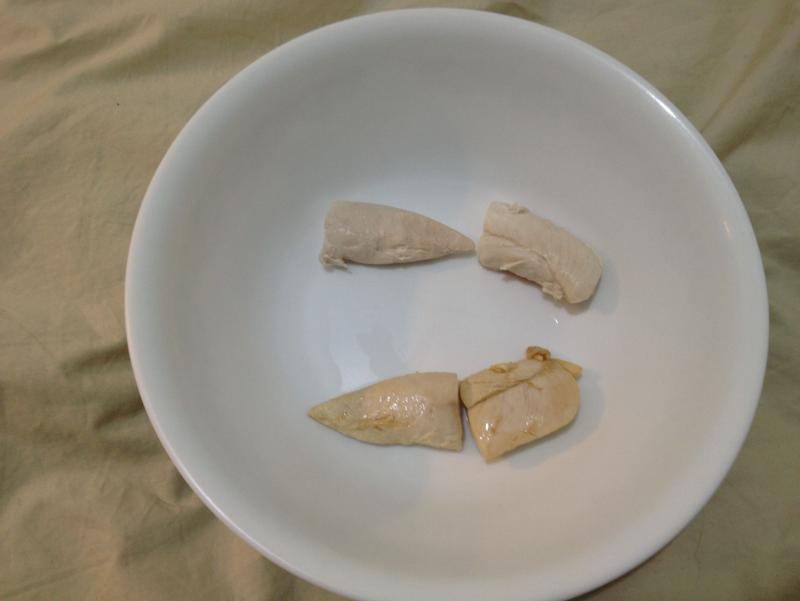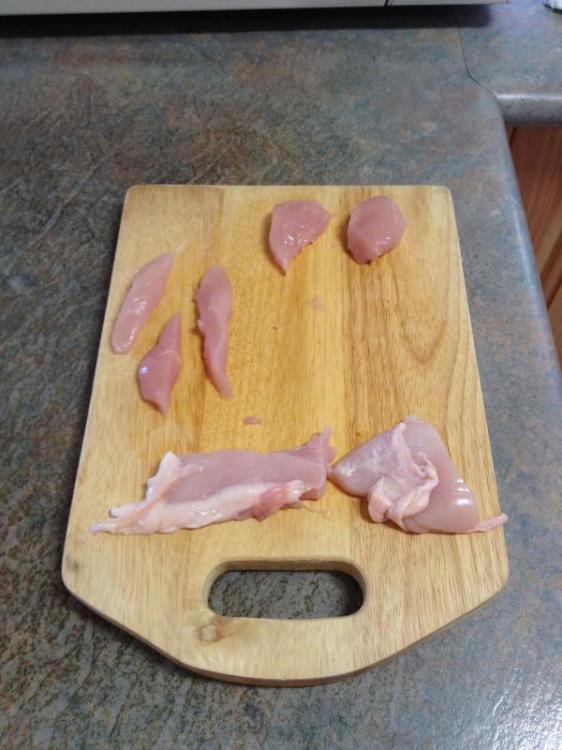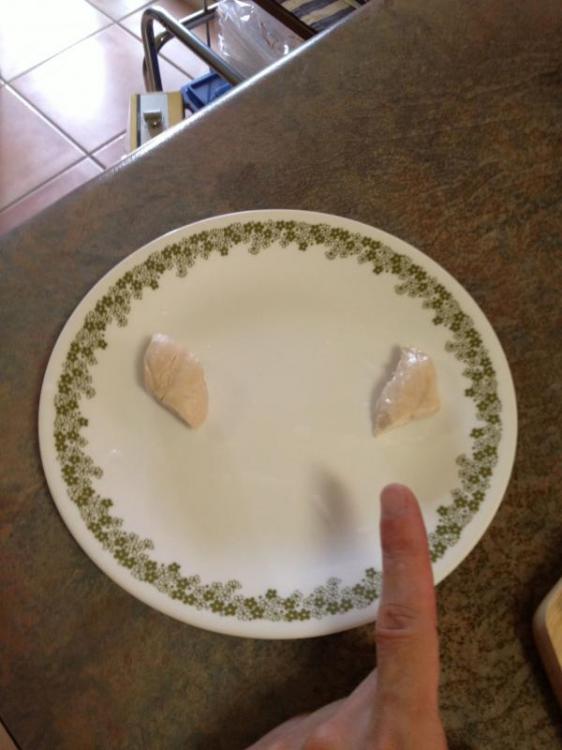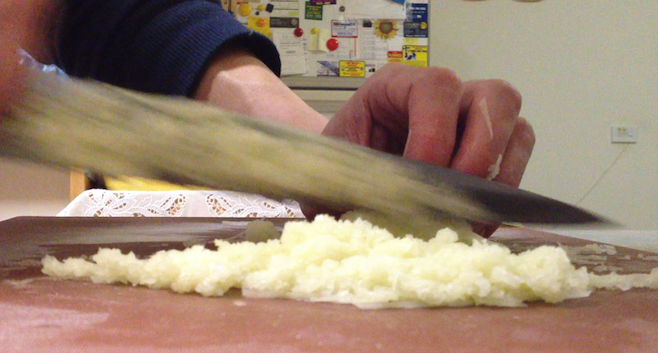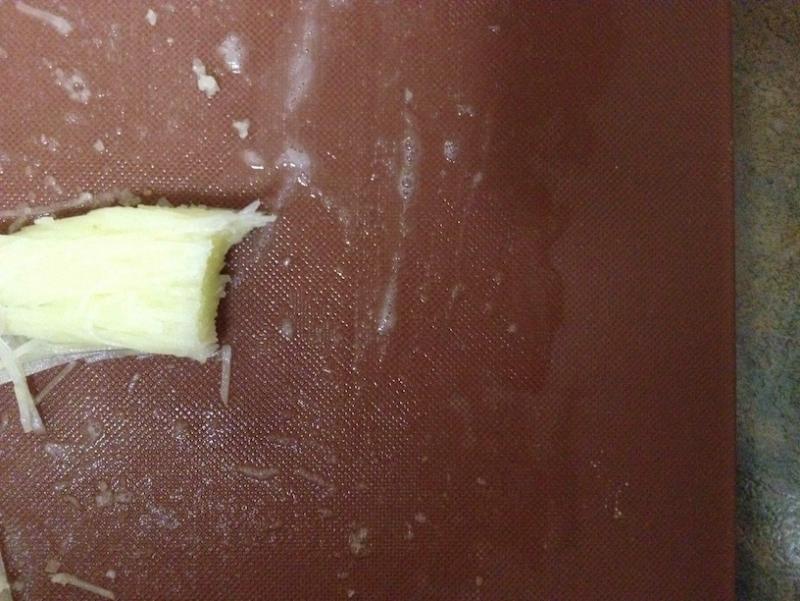-
Posts
56 -
Joined
-
Last visited
Content Type
Profiles
Forums
Store
Help Articles
Everything posted by skyhskyh
-
I heard somewhere or i got confused? I heard that carrot and daikon should not be cooked together because it is bad for heathuf eaten? Eg stewing carrot and raddish, picking raddish and carrot together...
-
Will high heat then avoid this food sticking to pan? In other words, the hotter, the non stick it will be? Or is it that if too hot, also sticky?
-
What makes the food stick to the pot or pan? e.g. Pan frying a piece of fish on a pan, poaching an egg in a pot What's happening there?
-
2 more experiments: Poach eggs in salted water: Yep. I have also tried poaching egg with highly salted water. After cooked, rinsed with running water. Taste check: it has salty taste (not as strong as the salted water though, but can taste saltiness) Hard Boil eggs in salted water: Nope. Another experiment I did was hard boil eggs in salted water. Basically, the result was no salt taste.
-
Did another experiment on cooking some chicken in just water VS cook some in flavoured liquid. The flavoured liquid was made by boiling and simmering water from dried bay leaves, dried star anise, dried sichuan pepper, dried cloves. The results: The chicken cooked in just water. Obviously, bland, only chicken taste. The chicken cooked in flavoured liquid. Basically, only outside, food surface has taste. (both were rinsed with water to get rid of any flavoured liquid that may stick on the surface of the food.) the bottom is the one cooked with flavoured liquid, the colour of the liquid is stuck on the surface, cannot be washed off. I just think salt and flavours is different. (this experiment is not something I wanted to back up any theories, just something I did to see if flavours can go inside the food if the food is cooked in a flavoured liquid medium)
-
Did you rinse with water after they are cooked? or just drained?
-
Thanks. I assumed the potatoes are cut pieces when they are cooked in the salted water? How much salt did you need to add afterwards (approximately... maybe 50% more to complete it to be a well-seasoned?)
-
I understand. But I was thinking whether the salty taste came from the water that is left on the food surface after cooked or it actually went inside the food. And from the experiment I did, it seems it's more frim the salted water that still coating the food.
-
Reason and Curiousity: My theory and quite common sense that when food is being cooked, water comes out from the food. For example, when we pan fry vegetables, very obvious that water came out. Lots and lots of them too. Accordingly, I was thinking if the food is being cooked, nothing goes in because water is being pushed out. But some basic cooking recipes, like boiling vegetables, they are cooked in salted water. So, I would like to check if saltiness really does go in or no. Goal: Wanted to see if salted water will put saltiness into the food. So: Cut some chicken pieces from chicken breasts. Cooked some in just water. Some in highly salted water (very very salty taste) Process and Results: 1st experiment: Cut some slices. Cooked in salted water. After cooked, rinsed the chicken with running water to make sure no salted water at surface of food. Checked taste. Not much salty taste can be noticed. 2nd experiment: Then cooked one in just water. Cooked another one with similar size in very salty water. Rinsed the chicken with running water. Compared the two. Could tell the difference but only slight. The one cooked in highly salted water has saltiness in the chicken. Comparing to the bland chicken piece that was cooked in just water, not much difference though. (However, this may still mean that saltiness didn't really go in but some of the salted water went between the meat muscles, then when rinsed through water after cooked, the running water didn't rinse through the muscle spaces, because cooking time in salted water was longer than rinsing time). Nevertheless, not sure the science behind this, but practically speaking, even after rinsed, could taste salt but slightly. 3rd experiment: Cooked one bigger chicken piece in highly salted water. Just drained by flicking it. No rinsing with water. Surely could tell it has salty taste. Not as much as the salted water. This make sense since I flicked drained it, meaning not the whole food surface is covered with the salted water. Only some is attached on the surface, so in theory, and logically, it had slightly lower slaty taste. Theory. After Thoughts: 1. This is different to cooking pasta, dried mushrooms, rice since these are dried, and they rehydrate during the cooking process. 2. If the food needed to be rinsed with water after cooked, then if the desired goal is to have the food tasted as a well salted food, then this means the water needed to be very very highly salty. (meaning waste of salt, and will be costly, alternatively, just less water to increase salt concentration) 3. Flavour may be different. So have to experiment with cooking liquid with just flavours, no salt. Just 2 photos of the experiment I took: More Thoughts, experience, theories, opinions welcome.
-
I have taken close up videos of my cutting and tried to find problems and answers. At this moment, I believe the problems and solutions (which worked much better) are: Initial thrust / speed / force: Too slow or too "weak" that my initial thrust didn't start cutting the food but push the food out, then start cutting. I tried increased speed a little, and somehow aimed "consciously" to insert more force to cut immediately, it helps the most. Second thing is (although I don't think it mattered much) was that if I land the knife above the food on the chopping board first before touching the food (compared to knife in mid air, start cutting the food, and land at chopping board later), this helps a little since it is a curved edge knife, by doing this, the knife was actually doing a more pushing food down than pushing food forward. I think the speed and initial thrust definitely helped a lot
-
Hello. 1. Is the Maximum temperature for steaming is 100 degree celsius? 2. When steaming below 100 degree celsius, what makes it less than 100 degree since for the water to turn into steam, it needs 100 degree. 3. Steam cooking. Is it like pan frying where the heat transfer is mainly from below going up only. (whereas in ovens, it's from all sides) *** My Thinking: Is it the density of water vapours in the air that the food is being surrounded? That is, more vapour "bubbles" in the air, higher the chance and more number of vapour can be condensed on the food surfaces, hence transferring heat to the food. Less "bubbles", less water vapours can be condensed on the food, hence less heat, and hence, lower cooking temperature? *** Accordingly, to get lower than 100 degree, three methods I can think of and how the science behind it: The liquid producing the steam is not boiling, so giving less vapours up to the air even though those bubbles are still 100 degree? With lid open, the steam coming up, some escaped to other places, or got blown away, hence not much vapours can be landed on the food, hence less hot? With electronic steamer, I guess it produce less vapours than if steaming at 99 degrees celsius? Thanks
-
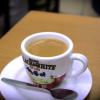
Thermometer Usage. How Should I use it to measure properly?
skyhskyh replied to a topic in Kitchen Consumer
I guess there shoulnt be any problems if i use the oven thermoeter inside a steamer? I wonder if i throw inside hot deep frying oil, would it be ok too since the temperature range should be high for oven thermometer? -

Thermometer Usage. How Should I use it to measure properly?
skyhskyh replied to a topic in Kitchen Consumer
If I want to measure temperature of my oven or steamer, then what sort of thermometre should I and can I get? -
Hello, Firstly, I am thinking to buy a good thermometre, this one seems quite handy and quite good. Recommened by Modernist Cuisine Site Any people here have used it and has any feedback to give? good or bad or some tips... Secondly, the other things I would like to ask is about how to use thermometre in general. There are some situations I can think of that I wanted to test out, e.g. how hot is the oven I am cooking my food in, how hot is the steamer cooking the food... The problems I am concerned is, is it suitable to place the whole thermometre inside the oven, close the lid, after a while, open it and check the oven temperature? Same goes with steamer, is it suitable to throw in the whole thermometre in, steam it, and check temperature later? Will the plastic or whatever material the thermometre is made of melt? Will it break the thermometre? Thirdly, if it is not suitable to throw in the thermometre, then what steps I can go about in order to measure accurately about those temperatures? Thanks in advance
-
For example, chopping a bunch of chives (it's not chives in the photo) Then those food near the top of the chopping board end is longer.... like this: DO you also have this when you chopping bunch of food? HOw do you avoid this? Note: My knife is sharp already
-
Going to osaka and kyoto next next week for 6 days. Hotel in osaka. Love to get suggestion on good eatery places, and food which i must try, and cooking equipments and cooking books. My desired criterias: * Tempura. Sushi / sashimi places: Good places to have tempura and sushi / sashimi, so that afterwards, i would know what is a good "standard". (because i had done tempura and sushi / sashimi sections in restaurant, i would like to grasp what is a good standard i should aim for and compared to) * Famous / must try / iconic Japanese food: Eg okonomiyaku, tako taki, yaki niku, etc... What else?.. And where i should go for them ? * Cooking equipment, knives, bags, etc: I know there's a street called Douguya Suzi near Namba where it is a street of cooking equipment, etc… Is it common to bargain or is it rude to do so? * Cooking Books! Where to go to buy them? Obviously I can't really read Japanese "much", good to have translations, also kanjis are bit ok as i am originally from hong kong. * Price range: Reasonably priced / Avg. price. * the so far Eatery places suggested by some people i know: - Was told that in Daimaru, at Osaka Station, Umeda, inside Daimaru, there's a famous restaurant, avg. priced called Kicho or something. Was told it's good to try, is it? - Was also told if I go to Namba or Shinsaibashi, then go to any restaurant places, they are good, is it?
-
Just those "mix garden salads" we can buy in Melbourne markets
-
Brining Cucumber (jabara-cut, Serpent belly cut) to take water out VS MC book on brining: I have seen chefs especially Japanese chefs and books, do the jabara-cut on cucumbers, and then soaked them in salted water, they say this will take water our of the cucumber. After reading the Modernist Cuisine book on Brining, it touches on how meat and seafood gain water in brining, once reaches 6% salinity, water leaks out, ... blah blah blah Now obviously cucumber is not meat nor seafood, I wonder if brining vegetables also actually add more water rather than take water out? Also: about Brining ovals such as fish male "sperm" Some Japanese chefs I have seen, after they fillet a fish, they place the fish "sperm" (or male organs, whatever the name is) into salted water to take out water, then blanch and cook it in liquid, etc... Is this brining ovals also really adding water rather than taking out water?
-
How long till the Vegetables die? after put on dressing (vinaigrette): Situation (in a restaurant kitchen): I accidentally put vinaigrette dressings on the salad vegetables because I thought there was an order. Realising that there was actually no order, I put this salad on the side thinking I could re-use it later in the night. (it was only approx. the start of the service time) The head chef took the salad, told me that it will die and threw away. I want to find out whether this is true or not? in my opinion, it won't (if using it later in the night) Assuming that there will be salad order and assume that the salad order will be say 2 hrs later, will the vegetables be already dead or "not desirable" at all? thanks in advance
-
Thanks... My intention is not just bring down the company or sue them or anything if it really has unsafe practises. My main reason is want to: 1. Protect my health! And any health issues i might have accumulate by doing the "could be dangerous" activities 2. If i do find out it is truely unsafe, i will refuse to do it because it is the right thing to do. Now... Thanks for the input and info, i guess the steps i need to take now in order to determine is it safe to use it: 1. Look up google, for the company name and find its msds? (not sure whether i should ask the restaurant to give me, it may imply i am planning / thinking something bad, etc) 2. If the msds or whatever states require gloves, try not to inhale, be careful not to get in the eyes, ... Does this mean as long as if i use gloves, be careful not to get in my eyes, ... Then i am "safe" to use it? ... Another thing is: I am still curious whether it is common that restaurant staff need to use these strong chemicals to clean ovens, canopies..? I want to know because first: - i wonder if this company is just doing normal common thing or i am just too sensitive about these...making too big of a deal out of this - secondly, i do plan to open my own in future some years later, so i should budget for this if it is common practise to actually get cleaning professionls to do it rather than do ourselves Thanks
-
It does indeed can clean plate quite well, i amnrefering to some plates which havent been properly eashed for long time But i am not concern whether it cleans plate good or bad... I am only concern and would like to know how dangeours is it... And is it supposed to be for restaurant people to use or it is only for "cleaning companies" to use? If it really is unsafe and not supppsed to be for kitchen staff to use, may be next time i will politely execute my rights and refuse to do it.
-
Hi all, How dangerous is oven cleaners? I read on the label, it has corrosive sticker with number "8" Is it appropriate for kitchen staff to use it? The boss asked some kitchen staff to use it for plates that are becoming too dirty overtime, is it illegal to do so? Or am i just making it too big of a deal myself? Thanks Ps yes we can wear gloves....
-

"Modernist Cuisine" by Myhrvold, Young & Bilet (Part 3)
skyhskyh replied to a topic in Cookbooks & References
nice. How long did the shipping take? just found out boarders sell for $799.95 lol -

"Modernist Cuisine" by Myhrvold, Young & Bilet (Part 3)
skyhskyh replied to a topic in Cookbooks & References
I did a search, and found I can possibly get $650aud locally, is it good deal? -

"Modernist Cuisine" by Myhrvold, Young & Bilet (Part 3)
skyhskyh replied to a topic in Cookbooks & References
cool thanks


